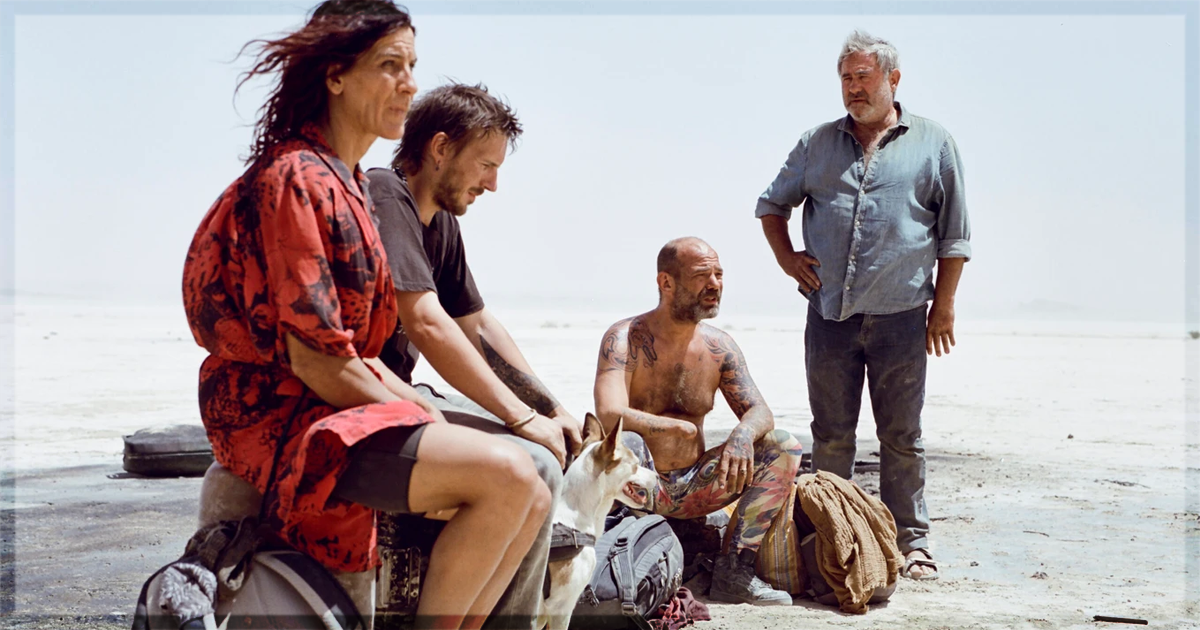Sirât is the rare movie that should be seen absolutely cold. I mean it, stop reading this review right now until after you have seen it, then come back for when you need someone to hold your hand afterwards. For Sirât manages to deliver one of the greatest shocks ever put to film, and then manages to go even further than that. It is a heart-rending and very unusual triumph.
In a time before cellphones, a desert rave in Morocco is populated with the usual unwashed drugged-up, dropped-out Eurotrash burnouts, with two exceptions. Those are the middle-aged Luis (Sergi Lopez) and his son Esteban (Bruno Núñez), who is ten or so. They are searching for the other member of their family, an adult daughter who has been out of touch for several months and last they heard could have been at this rave. Luis and Esteban are so obviously out of place everyone treats them with careful kindness, but only one woman, a Spaniard with face tattoos named Jade (Jade Oukid) mentions another rave that she could also be attending. It’s not even a sliver of hope, but Luis has nothing else. When the police close down the rave, Jade causes a scene by briefly leaving the departing convoy to pee. After a small kerfuffle her truck goes offroad, shortly followed by a repurposed bus. Luis hesitates, but at Esteban’s encouragement, follows.
Living in those two vehicles are five people: Jade, her boyfriend Tonin (Tonin Janvier), the couple Steffi (Stefania Gadda) and Josh (Joshua Liam Henderson), and the punkish Bigui (Richard Bellamy) who the others treat like a favourite cousin. Josh also has a dog. Esteban has a dog too, who ends up seizing one night after eating someone’s unburied turd that was definitely full of acid. It goes without saying that the drugs are kept away from Esteban, and Luis quite smartly defers to Tonin and Josh in all decisions. The five ravers are bemused at the new additions to their party and worried about Luis’ car, which is not even slightly meant for going off-road, much less in desert conditions. But when they are negotiating to buy petrol Luis opens his wallet without hesitation so they decide not to send them away.
Between themselves they speak in a mixture of French, Spanish and English, and both Tonin and Josh have some Arabic. Tonin is missing part of a leg and uses a prosthetic; Bigui has only one hand, and doesn’t. Mr. Lopez, a Spanish star best known elsewhere in the world as the villain of Pan’s Labyrinth, doesn’t so much as act as inhabit his role as a brave man driven to his limits by a quest he cannot quite understand. For their part, all the ravers are expert at living off the grid; they have made their lives into a search for good feeling, and the very smart screenplay by Mr. Laxe and Santiago Fillol doesn’t for a second wonder why. Some people just do that, and it is okay.
Until it very much isn’t. Mauro Herce’s cinematography makes the bold decision to keep the exact same style no matter what is unfolding onscreen, leaving the gap between what we are seeing and our understanding of it for us to close. The many shots of the three vehicles in convoy are kind of like seeing a little kid toddling after its parents, which is some deeply appreciated humour. Laia Casanovas’ sound design and Kangding Ray’s pulsing music underscore the neverending chase the little group is in the middle of – for sensation, for succour, for the missing loved one, for a good time. And when everything goes to hell the concept of the title (in Islam, it is the path, thinner than a hair and sharper than a sword, everyone must walk in the afterlife over the fires of hell; most people fall off instead of reaching heaven) becomes a thing you can feel in your hands.
The intensity of the unforgiving desert setting, which was clearly filmed on location, adds an authentic layer of grit and grime to the performances, and does nothing to mitigate the shocks. Those shocks are brutal, like paddles to the chest, and echoed through the cinema in ways unusual to hear from a cynical festival audience like the one at Cannes. It is incredible that Mr. Laxe, working with what is mostly a cast of non-professionals, was able to make something of such power. And if you’ve read this before going to see the movie, be warned: it will stay with you much longer than its running time.
Sirât recently screened at the Cannes Film Festival.
Learn more about the film, including how to watch, at the Cannes site for the title.


